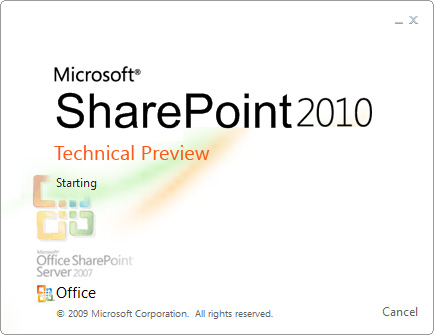Anticipating Sharepoint 2010: Making Enterprise Foundations More Flexible?


Last weekend's New York Times technology section piece about Microsoft Sharepoint is still their ninth most emailed tech story nearly a week later.
'Microsoft’s SharePoint Thrives in the Recession' is very general:
Companies like Ferrari, Starbucks and Viacom have used SharePoint to create their public-facing Web sites and for various other tasks.
but
“We don’t claim we do everything,” said Chris Capossela, a senior vice president at Microsoft. “If we do 50 percent of the functions that these other (software) companies do, but they’re the ones customers really want, that’s fine. The magic is that end users actually like to use the software.”
As I've noted before nobody ever got fired for buying Microsoft in this era, and even the promise of future, better iterations of Sharepoint are enough to put some companies strategic planning on hold until the newer, better version arrives.
Microsoft Office 2010 has been revealed and should be released during the first half of its eponymous title year, while Sharepoint 2010 (sneak peak here), arguably the foundations of the next generation Microsoft Office Suite will be announced in October and should arrive sometime next year also.
It's sobering to think that a whole generation of workers, particularly around processes, have effectively grown up in their professional lives with Microsoft Office offline documents since 1989.
This pre world wide web desktop document focused culture is being brought into the present day with Sharepoint and Office 2010, which will debut free online versions of Word, Excel, PowerPoint, and OneNote, coded to work in the three most popular web browsers (Windows Internet Explorer, Mozilla Firefox, and Apple Safari).
The transition of Microsoft IT based companies will likely shift over time to more role based workflows leveraging the web instead of local shared drives and offline content management. All this is generally good news - the big question is the degree to which Microsoft will be running a proprietary environment.
There is a constellation of partner companies who leverage the foundations of the current Sharepoint to make organized collaboration and interaction possible: it seems likely given Microsoft's past partner platforms these companies will be rewarded with slices of the future pie.
I'm sure SP 2010 will roll up some of the innovation of the last few years and provide much better future utility to their customers, which is going to be great. Like Oracle gaining control of Java and MySQL the question is how tightly the ecosphere will be controlled and directed.
In the Java world Oracle for now ultimately control the destiny of companies like Atlassian, who make the Java coded collaboration products engineers use widely and which are often deployed as the foundation of broader secure wiki based business collaboration spaces.
Similarly those choosing the Microsoft Sharepoint route need to be very aware of the perimeter walls of the environment they are entering or continuing to work in, and where the interoperability and connection points are with other technologies.
Smaller vendors are of course more agile and can quickly adapt to changes in their living conditions, where clients, unless they are alert, tend to react later once their business use case is compromised.
Interestingly the hot story in the NYT's tech section today is Sony abandoning their proprietary electronic 'EBook' code:
The Japanese electronics giant said the move "allows Sony to make its e-book store compatible with multiple devices and its Reader devices open to multiple sources for content." The ePub open standard created by a group including many content creating publishers, makes life easier for those of us choosing an electronic reader and will drive down device prices.
For those wanting to unify the various flavors of technology different divisions and departments use to capture structured and unstructured information and data and increase interoperation, standards over are really helpful.
While Oracle or Microsoft offering a unified solution to broader collaboration - on their terms and using their technology - may check the IT requirements boxes for business needs, the reality is most businesses need a solution tailored to their specific processes and relationships.

If the basic wardrobe of technology options you are working with are analogous to these Carhartt Men’s Flame-Resistant Midweight Canvas Coveralls, which is how previous generations of enterprise software have sometimes been perceived for fit, and which have often been abandoned for fragmented 'shadow IT solutions', we can look forward to more of the same tailoring issues in the future.
One size definitely doesn't fit all, but I'm hoping that Sharepoint 2010 is going to bring a valuable new foundational infrastructure to build web technology around that will meet ever more sophisticated business needs.